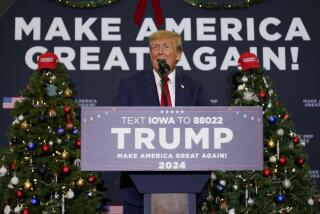America, 2008 and 2009
In this space a year ago, we published nine editorials over three weeks in which we attempted to analyze the race for the presidency in the context of enduring, essential American values. Where, we asked, does a belief in liberty as the founders envisioned it find modern expression in an era of terrorism? How does a nation formed by immigrants adjust to the cultural changes wrought by new waves of immigration, legal and illegal? Are American values so immutable that original notions of crime and punishment -- the death penalty, torture, the stock and pillory -- continue to provide useful guidance today, or are they so flexible that we are untethered by history and at the whim of judicial interpretation?
We hoped then, as we do now, for a rambunctious and confident country, secure enough in its values to trust the world to appreciate them. We lent our voice to those of women who refuse to accept government oversight of their reproductive rights, and to immigrants who cherish American values so deeply that they struggle to make their way to our shores. We rejected torture and indefinite detention of suspected terrorists as inimical to the values we uphold. Reflecting on disappointing rulings by the Supreme Court -- including one that allowed a high school student to be punished for displaying a head-scratching drug reference on a banner, at worst a juvenile exercise of his 1st Amendment rights -- we urged a more expansive appreciation for speech and protest, mainstays of this nation from its earliest days. Throughout, we hoped for peace and for the strength it would give America in the world.
Since that series appeared, much has changed. Then, we were in the midst of a long presidential campaign. California was on the eve of its most closely contested primaries in a generation. We had a troubled economy and a president resistant to federal intervention to right it. Now we have a president-elect, one endorsed by this page -- but we would give much to have merely the troubles of a year ago. In place of last year’s malaise and slowing growth, we are burdened with a deep recession. Fortunes and livelihoods have been lost, secure retirements snatched away from those who earned them.
Faced with these problems, the incumbent president spent billions of taxpayer dollars to rescue failing businesses and banks. The paradox is dazzling: Companies once proudly independent now owe their livelihood to federal money showered on them by a Republican president in the waning days of his relevance.
Around the world, America’s standing has risen over these last months, if only on the promise of change. The election of Barack Obama was greeted with celebrations from Indonesia to Kenya, from Latin America to Europe. Just this month, Irish President Mary McAleese paid The Times a visit and, in a cheerful, illuminating session with reporters and editors, movingly remarked on the outpouring of optimism and goodwill that accompanied Obama’s victory. McAleese, whose son campaigned for Obama and was “completely electrified” by him, compared his effect on Europe to that of John F. Kennedy. “That’s a remarkable phenomenon, and it’s a phenomenon that I hope will remain, that will galvanize, that will gather,” she said. “That’s what Europe hopes for, that the traditionally strong relationship -- which is a familial relationship, a relationship of kith and kin -- between Europe and the United States will really be strengthened during Obama’s time in office.”
Obama’s commitments
In the context of American values, Obama is both symbolically and substantively significant: He represents a gigantic step in this country’s long attempt to narrow its racial divisions, and his political views offer the potential for progress on many fronts. He has pledged to restore basic American legal principles by closing the detention center at Guantanamo. The nation should hold him to his word. He has promised to reverse the Bush administration’s devastatingenvironmental record and commit his government to addressing climate change. Now he must deliver. And, having opposed the war in Iraq, he vowed to end it. In our view, the sooner the better.
As a teacher of constitutional law, Obama is fluent in the language of American history and rights, as he amply demonstrated during the campaign. In just a few weeks, he will occupy an office in which he can do more than just embody or appreciate those values, but advance them. In building his administration and laying out its early goals, Obama has pledged to draw on conservatives as well as liberals, Republicans as well as Democrats. We commend him for it.
But Obama’s commitment to governing with bipartisan support inevitably challenges the depth of his ideological convictions. To cite just one issue on which Obama could show resolve at the risk of offending some of his more conservative backers: A man whose own life is the result of an interracial union must end his dithering on same-sex marriage. It is all well and good to respect the views of those who do not accept such unions as the next step on our historic path toward true equality for all, but Obama must not be swayed by them. He owes it to gays and lesbians to abandon his hedged support of their civil rights and offer an unequivocal endorsement of gay marriage. He already has waited too long.
Meanwhile, circumstances have bestowed on Obama a far more difficult nation to govern than the one he set out to lead. In the space of just a few months, one venerable institution after another has teetered toward collapse. Banks, insurance companies, automakers -- all have fallen in rapid succession, prompting a staggering set of economic calculations by Washington. The costs of bailing out the economy have skyrocketed, to the point that the incoming Obama administration is seriously considering a stimulus package that could exceed $700 billion -- on top of what the Bush administration already has committed to that process. Without it, members of Obama’s team say, the economy could shed 4 million jobs in the next two years; the current situation, by common and bipartisan agreement, is worse than any faced by this nation in half a century.
The road to recovery
The result has been a radical shift in the national debate over economic recovery, with deficit spending now accepted indefinitely and the stakes for social programs uncertain as cascading catastrophes defy the imagination.
Take one sobering example: A year ago, Obama campaigned on a healthcare plan to extend insurance to nearly all Americans; in the presidential debates and through the rest of the campaign, critics worried over its extravagant cost, estimated by some to be more than $60 billion. Just this month, Bernard Madoff was arrested on allegations that he ran a Ponzi scheme that bilked investors out of roughly $50 billion. That figure could well prove inflated, but it is shocking to imagine that one man is accused of squandering a sum large enough to represent a substantial down payment toward the repair of the country’s inequitable healthcare system. Madoff’s alleged scheme and its far-flung victims painfully remind us how the collapse of meaningful government regulation and enforcement has contributed to the perils of our economy.
Greed, arrogance, intolerance -- as much as we wish they were not a part of the American fabric, they are. And they have been much in evidence in recent months. They represent the prime challenge to Obama, just as the brighter virtues of our heritage provide him with a bulwark of principle. We are the nation that produced George Washington and Abraham Lincoln, Kennedy and the Rev. Martin Luther King Jr. But we also inhabit the land of George Wallace, Joe McCarthy, the robber barons, the John Birch Society and the Ku Klux Klan.
It is incumbent on our new president, then, to govern with humility but also with strength, to welcome others to his coalition but not to surrender his principles -- or to compromise the nation’s -- for expediency or convenience. We have lived through eight grim, violent and disheartening years. Intellectual prowess has been ridiculed, achievement belittled and virtue sacrificed for gain. It’s time to begin again.
With that hope, we end this entreaty as we did our series, bidding farewell to what has inhibited this nation’s promise and offering a plea that our leaders restore its status as a leading light of liberty. As we said a year ago:
“One characteristic of the Bush administration has been its wearying appeal to the weak, to those who are threatened by energetic political expression and instead take refuge in the slow forfeit of their rights; to those too timid to trust that hateful speech is best rebutted by more speech, not by squelching dissent; to those so unnerved by terrorism that they would condone torture. We live in a nation that once had the confidence to defend the speech and association rights of American communists even as it fought their sponsors and supporters abroad. Yet that same nation now flinches at the threat posed by a high school student who displays a banner that reads, nonsensically, ‘BONG HiTS 4 JESUS.’
“That is a depressing relinquishment of what has given the United States its place in history. We hope, with fervent optimism, for a president who will embrace our defining love of liberty and who will relish, not disdain, its many blessings.”
For last year’s series on “American Values and the Next President,” go to latimes.com/values08.
More to Read
A cure for the common opinion
Get thought-provoking perspectives with our weekly newsletter.
You may occasionally receive promotional content from the Los Angeles Times.






